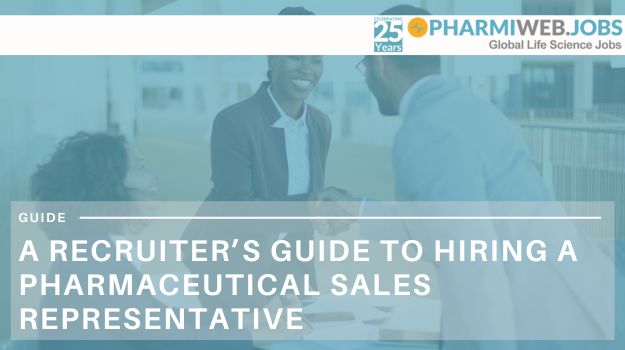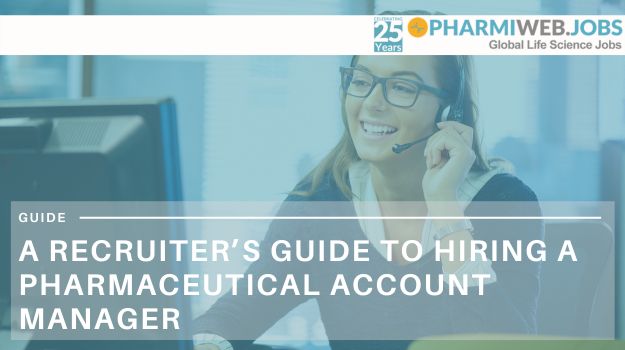A Recruiter’s Guide to Hiring a Pharmaceutical Sales Representative

In the rapidly evolving world of pharmaceutical sales, finding the right candidate to excel as a sales representative can be challenging.
To help you identify and engage strong candidates for the role of a pharmaceutical sales representative, we’ve created this short guide to share tips and advice on the candidate qualities to look out for, interview questions to ask, tests and assessments to use during the hiring process, and more.
Understanding the Role of a Pharmaceutical Sales Representative: What are the Key Responsibilities?
A pharmaceutical sales rep is responsible for promoting and selling pharmaceutical products to healthcare professionals. Their role involves assessing clients' needs, presenting suitable products, and persuading targeted doctors to prescribe their company’s offerings. They provide product information, deliver samples, and conduct sales meetings to increase awareness.
Reps must also stay updated with industry developments, monitor market trends, and collaborate with cross-functional teams to ensure effective product promotion. Maintaining accurate records of sales interactions and territory management is also crucial for their success.
Defining Your Candidate Profile: What Does a Successful Pharmaceutical Sales Representative Look Like?
Whilst qualifications and relevant experience still have a place in life science recruitment, skills-based hiring is gaining prominence in the industry as recruiters recognise the need to close the skills gap and find top talent that can drive innovation and success. By emphasising skills, you can identify individuals who may have unconventional backgrounds but possess the expertise needed to excel in the industry.
Whilst the candidate qualities you’ll be seeking will vary between roles, some of the key skills and traits you should be looking out for include:
- Excellent communication skills: Clear communication will allow representatives to build rapport, convey the value of their products, and confidently address any concerns.
- Sales-oriented mindset: Successful pharmaceutical sales representatives have a natural inclination towards sales and possess a competitive mindset. They are goal-driven, resilient, and motivated to achieve sales targets.
- Relationship-building skills: Look out for candidates who are personable, friendly, and skilled at networking. The ability to establish trust and long-term relationships can significantly impact their success in securing prescriptions.
- Adaptability and resilience: As the pharmaceutical industry is constantly evolving, sales representatives will need to be able to adapt to changing market dynamics and handle any rejection with resilience. Seek candidates who demonstrate flexibility, a willingness to learn, and the ability to navigate challenges.
- Strong product knowledge: Having a deep understanding of the pharmaceutical products they sell is an essential quality for a pharmaceutical sales representative. They should be able to effectively communicate the features, benefits, and usage of their products to healthcare professionals. This will allow them to build credibility and trust in their interactions.
- Organisational and time management skills: Pharmaceutical sales representatives often have multiple responsibilities and need to manage their time effectively. They should be able to prioritise tasks, plan their sales activities, and maintain accurate records of their interactions and territory management.
Remember that by focusing on skills-based hiring, you’ll allow for a more inclusive and diverse candidate pool, as you’ll be able to consider a broader range of candidates and create opportunities for those who may have been previously overlooked based on traditional criteria.
Interviewing Your Candidates: What Questions Should You Ask?
When interviewing candidates for the role of pharmaceutical sales rep, incorporate some of the below questions to help you assess their suitability for the role:
- Can you tell me about your experience and background in pharmaceutical sales?
- How do you stay up-to-date with industry trends and advances in medical science?
- Describe a time when you faced a difficult challenge when promoting a pharmaceutical product. How did you handle it?
- How do you build and maintain relationships with healthcare professionals? Can you give us an example?
- How do you approach cold calling or make initial contact with potential clients?
- Can you give examples of effective strategies you use to promote pharmaceutical products and drive sales?
- How do you handle objections from clients or healthcare professionals and turn them into selling opportunities?
- In your opinion, what role does effective communication play in being a successful pharmaceutical sales representative?
- How do you prioritise tasks and manage your time effectively to meet sales targets?
- Can you share an example of when you successfully exceeded your sales targets? How did you achieve this?
- Tell us about your approach to territory management and planning sales visits.
- How do you assess the needs of healthcare professionals and match them with suitable products?
- Describe a situation where you had to deliver a difficult message or present complex scientific information to a healthcare professional. How did you handle it?
- How do you approach negotiation and pricing discussions with clients?
- Can you give an example of a successful collaboration you had with marketing or medical professionals to support product promotion?
- What strategies do you use to engage and educate healthcare professionals on new product launches?
- How do you handle rejection or setbacks in the sales process?
- How do you ensure compliance with ethical standards and regulatory guidelines in your interactions with healthcare professionals?
- Can you describe a time when you had to adapt quickly to changes or unexpected circumstances in your work?
- Why would you be a good fit for our company and this role?
Whilst the exact questions you ask will depend on the person’s level of experience and the responsibilities of each role, these can be used as a general guide to help structure your interviews.
Assessing Your Candidates: What Tasks Could You Set?
Setting tasks for candidates during the hiring process can help to provide objective measures of a candidate’s skills and knowledge, allowing you to effectively assess their suitability for the role. By evaluating candidates’ performance in real or simulated work scenarios, you’ll gain a better understanding of how candidates would perform on the job.
For the role of a pharmaceutical sales rep, the following tasks and assessments could be used to help you evaluate the candidate’s suitability:
- Mock Sales Presentation: Ask candidates to prepare and deliver a mock sales presentation for a specific pharmaceutical product. Provide them with background information and key selling points and assess their ability to communicate complex scientific information effectively, answer questions, and engage the hypothetical audience.
- Case Study Analysis: Provide candidates with a case study that simulates a real-world selling situation. Ask them to analyse the scenario, identify potential challenges or objections, and outline their approach to overcoming these obstacles. This task assesses their problem-solving skills, sales strategy formulation, and critical thinking abilities.
- Role-Play Negotiation: Engage candidates in a role-play negotiation scenario with a hypothetical healthcare professional or customer. The task evaluates their ability to build rapport, persuade effectively, handle objections, and reach mutually beneficial agreements. Assess their negotiation skills, adaptability, and ability to think independently.
- Written Communication Exercise: Provide candidates with a sample scientific article or medical research paper and ask them to write a summary or brief explanation of the findings in plain language. This assessment tests their ability to comprehend complex medical information and communicate it clearly and concisely.
- Behavioural Interview Questions: During the interview, ask candidates behavioural-based questions that simulate real-life situations they may encounter as a pharmaceutical sales representative. For example, ask how they have handled situations involving difficult customers, managed rejection, or adapted their selling approach to different customer needs. Assess their responses based on their problem-solving, adaptability, and customer-centric approach.
Benchmarking Your Salaries: What is the Average Pay in the UK and USA?
Whilst salary will depend on numerous factors including location, employer type, contract type, years of experience and more, we’ve included below the average salary for a pharmaceutical sales representative in both the UK and USA, based on data collected by Indeed.
UK
In the UK, the average base salary for a pharmaceutical sales representative as of January 2024 is £29,656 per year. The highest-paying cities for this role are Leeds (£45,099 per year), London (£39,750 per year), Leyland (£25,075 per year), Reading (£24,740 per year), and Cambridge (£23,722 per year).
USA
In the USA, the average base salary for a pharmaceutical sales representative as of January 2024 is $78,260 per year, from a reported overall range of between $48,401 and $126,537. The highest paying cities for this role are Miami, FL ($100,495 per year), Tampa, FL ($88,215 per year), San Antonio, TX ($82,005 per year), Houston, TX ($80,631 per year), and Cincinnati, OH ($80,485).


